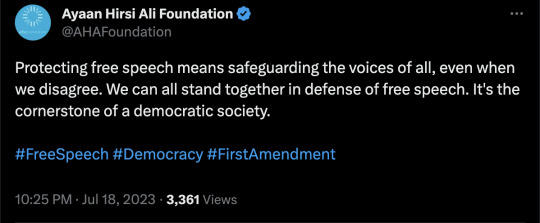#cancel culture is free speech
Link
Here I think it’s time to talk about the very serious right-wing effort to use free speech and freedom more generally as a flag for a political, social and moral project. On campus, for example, the constant harangues about cancel culture and wokeness on the left that you get from the right keep us from seeing enormous amounts of foundation money and use of the state to try to control what is taught, to build institutes and curriculums that comport with a right-wing engine. Guilford College, this little Quaker school in North Carolina takes half a million dollars from a foundation in love with Ayn Rand. Every econ and business major in the college for the next 10 years had to be given a copy of “Atlas Shrugged,” and at the center of the curriculum there had to be a course in which “Atlas Shrugged” was the required textbook. This story has been repeated over and over.
Then you have colleges and universities not so desperate but nonetheless willing to take large amounts of Koch and other right-wing-foundation money to set up institutes, even hire faculty. All of this is under the aegis of free speech, organized as correcting for wokeness and cancel culture. The right is also mobilizing the state. Not just to cancel math textbooks in Florida but the “Don’t Say Gay” bills, the C.R.T. bills. It’s important that we have our eyes wide open about that. Little episodes about cancel culture make great tidbits in newspapers and talk shows, but they don’t represent this larger and deeper project of the right of mobilizing state power and corporations for their agenda in schools.
276 notes
·
View notes
Text
I'm tired of rebellion only being acceptable if you rebel in a politically correct fashion.
I'm tired of hate speech being acceptable as long as it's directed at the "correct group."
I'm tired of watching the church bow down to deranged elitists and corrupt government.
I'm tired of truth being manipulated.
I'm tired of cancel culture being normalized.
I'm tired of intolerance being tolerated.
I'm tired of skin color being a factor in judging and loving others.
I'm tired of equality turning into revenge.
I'm tired of gender defining identity, expectations and capability.
I'm tired of the "kill all men" twisted doctrine.
I'm tired of misogyny and chauvinism.
I'm tired of the boxes and the stereotypes...
With no space allowed to exist in between.
Let's start a proper revolution.
A revolution of love.
A revolution of proud existence, proud resistance and total disregard to what is considered "acceptable."
A revolution they can't dictate. They can't profit from. They can't control.
A revolution they can't stick in boxes of left or right or central or up or down or sideways.
Anarchy in its purest form.
Reblog if you see through the political mind manipulation games of the modern world.
#anarchy#christian anarchy#christian anarchism#christian anarchist#politics#anti politics#anti republican#anti democracy#anti leftist#anti liberal#anti liberalism#anti right wing#anti conservative#people before profit#christian punk#christian alternative#feminism#cancel culture#hate speech#equality#anti racism#rebellion#reblog the shit out of this#rebel#political rant#political#acceptance#break free#freedom#christianity
23 notes
·
View notes
Text
“The current model of higher education, one featuring runaway spending and punitive intellectual rigidity, cannot survive.”
#affordability#cancel culture#censorship#college#college admissions#college readiness#critical thinking#economics#education#education reform#free speech#freedom of speech#higher education#online education#political polarization#remote learning#student loans#teaching#Online education
64 notes
·
View notes
Text
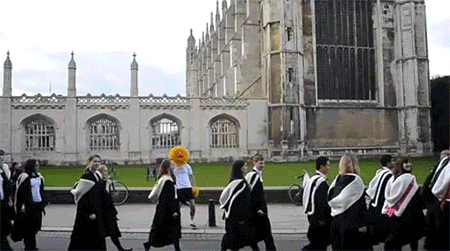
The university, in which it is possible to combine theoretical pretension with comprehensive ineptitude, has become the natural habitat of the ideological enthusiast. A kind of adventure playground, carefully insulated from reality in order to prevent absent-minded professors from bumping into things as they explore transcendental realms, has become the institutional base for civilisation self-hatred.
Kennth Minogue
#minogue#kenneth minogue#quote#ideology#university#free speech#cancel culture#woke#academia#cambridge#culture
71 notes
·
View notes
Text
By: Nate Silver
Published: Nov 2, 2023
“What Harvard students think” is a topic that invariably receives too much attention. But I don’t think that’s true for evaluating opinion among young people or college students in general — who, after all, will make up the next generation of journalists, business leaders, politicians and pretty much every other white-collar profession. And after seeing the latest polling on what college students think about free speech, I don’t concern over “cancel culture” or the erosion of free speech norms is just some moral panic. In fact, I think people are neglecting how quick and broad the shifts have been, especially on the left.
College Pulse and FIRE — the Foundation for Individual Rights and Expression, a pro-free speech advocacy group — recently published the latest edition of their annual survey. Although I don’t love using data from political groups — even ones I generally agree with — the good in this survey outweighs the bad. The methodology is detailed and transparent. And in surveying more than 55,000 undergraduates, the poll provides a look at student opinion across all sorts of colleges and universities — not just from the loudest or most privileged students at elite institutions.
Although I’ve seen a lot of media coverage about the FIRE survey, I’d never really dug into the details. I’m not sure exactly what I was expecting to see. But given my own political philosophy, I can tell you what I was hoping for: robust student support for free speech — perhaps in contrast to the often lukewarm support it receives among university administrators. Unfortunately, that’s not what the survey found. Here’s what it says instead:
College students aren’t very enthusiastic about free speech. In particular, that’s true for liberal or left-wing students, who are at best inconsistent in their support of free speech and have very little tolerance for controversial speech they disagree with.
Moreover, this attitude is broad-based — not just at elite schools. I was frankly surprised at how tepid student support was. A significant minority of students don’t even have much tolerance for controversial speech on positions they presumably agree with. There are partial exceptions at some schools — including my alma mater, the University of Chicago — suggesting the attitudes of professors and administrators play some role in trickling down to students. But this looks like a major generational shift from when college campuses were hotbeds of advocacy for free speech, particularly on the left.

[ A protest in favor of free speech as part of the Free Speech Movement at UC Berkeley. ]
Students have low tolerance for even mildly controversial speakers
The College Pulse/FIRE survey asks a long battery of questions, but many of them are focused on student perceptions about university administrators and not what they think about free speech themselves. Other questions ask about efforts to disrupt controversial speech — for instance, by shouting down a speaker. In these cases, there can be competing interpretations of what constitutes free speech — i.e. the students might say they are��exercising free speech by disrupting the speaker — so these aren’t straightforward to interpret.
However, another set of questions directly asks students about their tolerance for controversial speech with no competing speech interest — specifically, whether a student group should be allowed to invite a speaker on campus. The exact wording of these questions is this:
Student groups often invite speakers to campus to express their views on a range of topics. Regardless of your own views of the topic, should your school ALLOW or NOT ALLOW a speaker on campus who previously expressed the following idea: ______________
Then, the survey presents students with a set of six examples — three pertaining to controversial ideas held by conservative speakers, and three about controversial ideas from liberal speakers. The order in which the students are presented with the examples is randomized in the survey — but here I’ll list them here with the conservative ideas first (which I’ve labeled as C1, C2 and C3) and the liberal ones (L1, L2, L3) second.
C1. Transgender people have a mental disorder.
C2. Abortion should be completely illegal.
C3. Black Lives Matter is a hate group.
L1. The Second Amendment should be repealed so that guns can be confiscated.
L2. Religious liberty is used as an excuse to discriminate against gays and lesbians.
L3. Structural racism maintains inequality by protecting White privilege.
Let me pause for an annoying little disclaimer. In today’s newsletter, I’m going to use the term “liberal” as synonymous with “progressive” or “left-wing”, even though I generally try to avoid that. Indeed, free speech is a bedrock principle of liberalism as classically defined. But since the FIRE survey uses “liberal” as a stand-in for left1, I’m going to do so as well.
OK, with that throat-clearing out of the way, let me show you the numbers, broken down by students’ self-described political orientation. The figures in the table reflect the percentage of students who would allow the speaker.

If you want to critique the examples FIRE chose, I’m sympathetic up to a point — the conservative statements seem slightly spicier than the liberal ones, although maybe that reflects my personal biases. I figured that the students would have a strong dislike for speakers C1 (“transgender people have a mental disorder”) or C3 (“Black Lives Matter is a hate group”) because they could be seen as promoting hate speech or misinformation. I don’t personally think “hate speech” and “misinformation” are terribly coherent categories, but leave that aside for now. This is a survey of college students, including some as young as 18. So I was just hoping to find general, directional support for free speech — even if not necessarily in every instance from first principles.
But I was much more surprised by responses to speaker C2 (“abortion should be completely illegal”). People obviously have strong feelings about abortion, and a complete abortion ban is unpopular. Still, this is a commonly-articulated, garden-variety unpopular political opinion that doesn’t make any sort of factual claim and can’t reasonably be construed as hateful. You’d think even students with a tentative, half-baked belief in free speech principles would tolerate it. And yet, 57 percent of students — including 68 percent of liberals — thought a speaker expressing this anti-abortion viewpoint shouldn’t be allowed on campus. That number kind of shocked me.
For that matter, tolerance for some of the liberal viewpoints isn’t all that high either. Only 57 precent of students think L2 — the speaker who says religious liberty is used as an excuse to discriminate against gays and lesbians — should be allowed, even though that sort of claim has been common in American political discourse for decades now
Still, to be clear, there’s a big gap between the liberal students and the conservative students. The conservatives are actually quite consistent, with roughly 60 percent support for both liberal and conservative speakers. The liberal students have a relatively high tolerance for liberal speakers, but little tolerance for conservative ones.
This isn’t just a Harvard problem
Harvard and other elite schools often rate poorly in FIRE’s overall free speech rankings — Harvard is dead last in the latest edition, in fact. But the survey data I’ve been describing is just one component of those rankings. When it comes to controversial speakers, students at non-elite colleges are just as intolerant as their Ivy League counterparts. Here are the average numbers across various college typologies:

You can look at this data in a couple of different ways. On the one hand, the Ivy League schools are slightly more tolerant of controversial speakers overall. On the other hand, they have a particularly wide gap between tolerance for liberal speakers and conservative ones. Students at elite small colleges — the so-called Little Ivy group — have an even bigger gap and stand out as being particularly inconsistent. Still, the numbers don’t differ that much from one type of institution to the next. As I’ve said, student support for controversial speech is low across the board.
What about at individual universities? I don’t want to make too much of these rankings because there are potential sample size issues — the survey polled a couple hundred students per school on average. So let me just list the top 5 and bottom 5 schools, which differ from the average enough to be comfortably outside the margin of error.

Hillsdale College, an expressly conservative university, unsurprisingly has off-the-charts tolerance for conservative speakers. To their credit, though, students there also have above-average tolerance for liberal speakers. Meanwhile, the University of Chicago, which has a long history of support for free speech — reiterated in 2014 in the form of something called the Chicago Principles — ranks third. Washington and Lee University, which adopted the Chicago Principles, ranks second.
Why did the campus left turn against free speech?
Rather than provide a comprehensive analysis of the reasons for this shift — perhaps we can go into more detail in future editions of this newsletter — let me just inventory a few hypotheses. By no means are these mutually exclusive — I suspect they all play a role.
Reason #1: Woke ideas are popular on campus and are considerably less tolerant of free speech than traditional liberalism
I’m at the point where I’m tired of putting the term “woke” in scare quotes. Although the word is sometimes abused by conservative politicians, there exists a distinctive and influential set of ideological commitments that differ from traditional liberalism or leftism. And wokeness — or whatever you want to call it — particularly differs from liberalism when it comes fo free speech, as James O’Malley writes:
The ideological shift that has surprised me the most is witnessing “free speech” become coded as a right-wing value, and something that when the phrase is uttered makes people sympathetic to “woke” ideas suspicious.
The argument is that unrestricted speech harms people. There isn’t an equal platform to speak in the first place, so racists and other unpleasant people are able to use the norm of free speech to terrorise groups who are oppressed.
I think the strangest example of this new norm in action was the response to Elon Musk buying Twitter. Traditionally, liberal ideology is fearful of overreach by powerful figures like billionaires, and is in favour of more permissive speech rules and norms as a hedge against their power. But the “woke” complaint about the new owner is that under Musk’s leadership, Twitter will not be censorious enough, and will be too permissive over what speech is allowed on the platform.
Reason #2: Normie Democrats are turning against free speech because of concerns over misinformation
However, wokeism isn’t the only left-of-center movement that has raised concerns about free speech. Rank-and-file Democrats have shifted on the question too and now strongly prioritize restricting false information over protecting freedom of information:

Note that this shift is fairly recent — it came between 2018 and 2021, so it can’t just be attributed to the election of Donald Trump. (Maybe it had something to do with COVID?) And it’s a big shift — Democrats went from 57/40 in favor of free speech over misinformation in 2018 to 28/70 against it in 2023. A change that large will inevitably trickle down into universities with their mostly liberal students, professors and parents.
Reason #3: The younger generation is risk-averse in general
Teens and young adults in the U.S. increasingly defy the stereotype of younger people taking more risks. Instead, they show increasing rates of depression and neuroticism, and decreasing rates of risky behavior such as drug use and sex. This is particularly true among young people who identify as liberal. If you think controversial speech can cause harm — from psychological trauma to actual, literal violence — you might conclude that it’s not worth the risk.
Reason #4: The United States may be reverting to the mean
The U.S. has historically been an outlier in public support for free speech, and our laws are more protective of it than in many other Western democracies. Britain, for example, has significant curbs on speech, as does Germany. If America is becoming less distinct from the rest of the world — not something I regard as a hard-and-fast fact but a plausible theory, especially in the multicultural environment of universities — we might expect support for free speech to decline.
Reason #5: The adults in the room are often hypocrites
I don’t think it’s always true that people are hypocritical about free speech. Some partisans literally can’t seem to understand that some of us at least strive for a more high-minded, principled approach, even if we don’t always live up to it. Thinking that everyone else is a hypocrite is a convenient belief to hold if you yourself are a hypocrite.
But is there a lot of hypocrisy around free speech? Of course there is. Republicans who rail against wokeness put significant limits of their own on academic freedom. Supposed “free speech absolutist” Elon Musk has often taken a censorious approach toward content he doesn’t like while tolerating censorship by foreign governments.
While I’ve somehow made it this far without using the words “Israel” or “Palestine”, recent international events have uncovered instances of hypocrisy too. I have no interest in refereeing every incident, but cases like this — in which editor-in-chief Michael Eisen was fired from the life sciences journal eLife for retweeting an Onion article that expressed sympathy with Palestinians — fall under any definition of “cancel culture”.
Meanwhile, major donors are reconsidering their contributions to universities whose administrations they say weren’t sufficiently critical of Hamas and the October 7 terrorist attacks. Personally, I think donating to an already-rich, elite private university is one of the least effective possible ways to spend your money, so I’m happy whenever donors find an excuse to pull back. But leaving that aside, I don’t think these donors have really thought through their strategy.
True, a lot of university presidents have expressed a conveniently-timed, newfound commitment to free expression that didn’t match their previous behavior. Still, if I were one of those donors, I’d say “great, and now we’re going to hold you to it. The next time you stray from your commitment to free speech — particularly when it comes to students or faculty who express conservative or centrist viewpoints — we’re going nuclear, permanently ending all contributions to the university and telling all our rich friends to do the same.”
And although I’m not sure I have any business talking to college students — although I have delivered a number of guest lectures and commencement addresses — if I were, I’d use this as a teaching moment, telling students that now that they’ve found out what it’s like to stand up for a controversial, unpopular position, I’d hope they’d be more respectful of the rights of others to do the same.
Because unless someone is willing to do that — to defend free speech in a principled, non-hypocritical way — the game theory says it’s just going to be a race to the bottom. And given the increasingly tenuous commitment to it in many corners of American society, free speech is going to lose out.
--
1 This is an understandable decision, given that it’s a survey of popular (student) opinion. In conducting a poll, you want to use language the respondents will understand and use themselves.
==
Reminder: Harvard received a 0.00 score out of a possible maximum of 100.0 in FIRE's College Free Speech Rankings.
In 2020, Harvard ranked 46 out of 55 schools. In 2021, it ranked 130 out of 154 schools. Last year, it ranked 170 out of 203 schools. And this year, Harvard completed its downward spiral in dramatic fashion, coming in dead last with the worst score ever: 0.00 out of a possible 100.00. This earns it the notorious distinction of being the only school ranked this year with an “Abysmal” speech climate.
What’s more, granting Harvard a score of 0.00 is generous. Its actual score is -10.69, more than six standard deviations below the average and more than two standard deviations below the second-to-last school in the rankings, its Ivy League counterpart, the University of Pennsylvania.
#Nate Silver#free speech#freedom of speech#freedom of expression#liberalism#liberal ethics#liberal values#illiberalism#censorship#cancel culture#religion is a mental illness
16 notes
·
View notes
Text
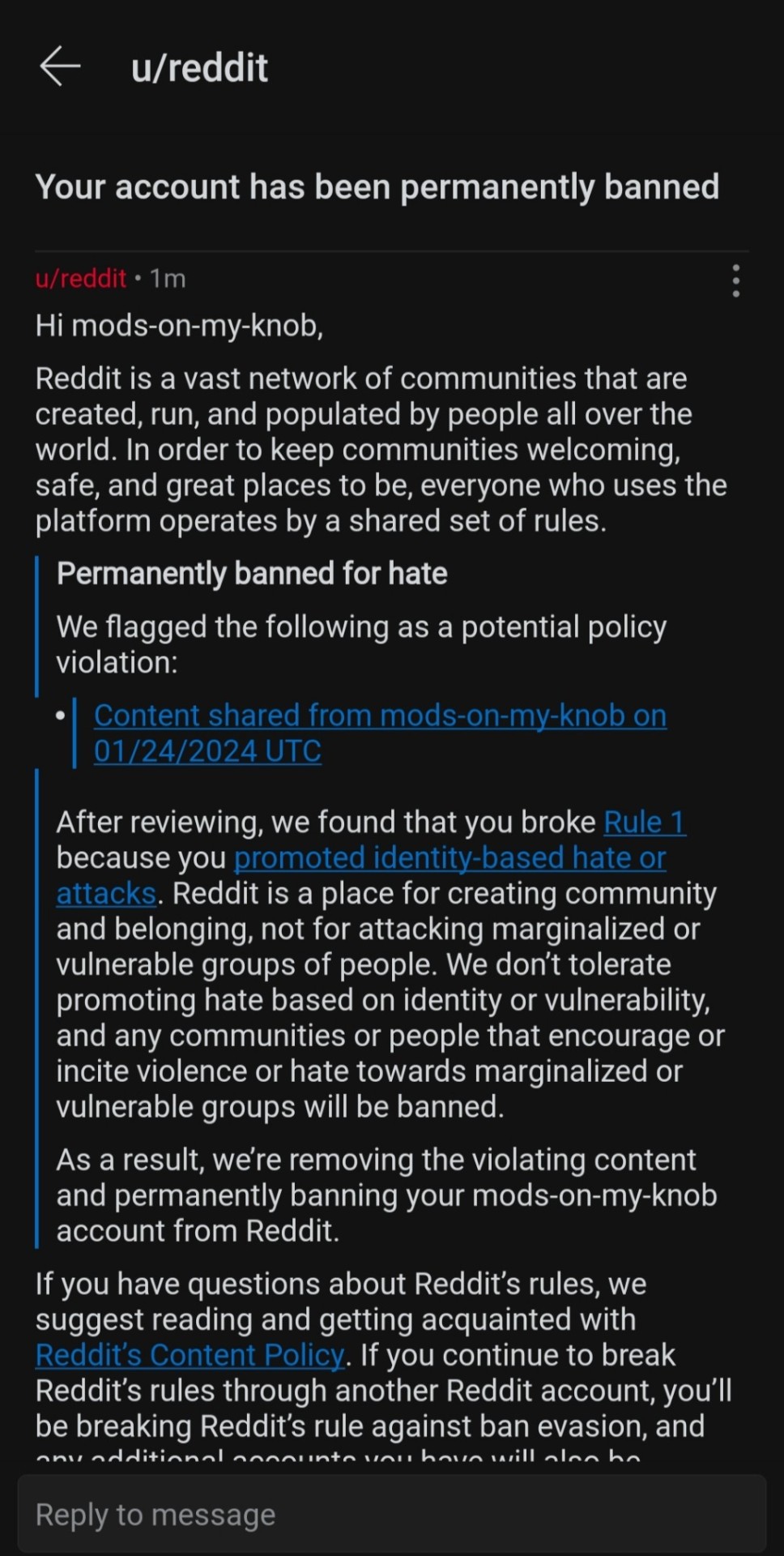
Update: I was banned for being mean again. I am very against the trans agenda and when people say they want genderqueer characters in children's games like Animal Crossing, I become very angry. Reddit did not like what I had to say about the manner.
This is not the same PC culture we had in the 80s and 90s. This is something far more nefarious.
Fuck Reddit.
#fuck reddit#anti reddit#free speech#christian#conspiracy#freeblr#bible#conspiracy theory#truther#tradfem#truth#christian woman#cancel culture#pc culture#censorship
8 notes
·
View notes
Text

Cersie Lanister lives in Westeros on Planetos but definitely has "Accountability Culture Proponent" vibes and would make a seamless transition into political leadership within the Liberal in Name Only, Western Maoist, Well-To-Do, Out of Touch, Sheltered, Privately Educated, Metropolitan, Privledged Victim Mileau.
Hell in this world, she would find an effective loophole in the modern era to defend her Incest by claiming that it's actually, "just a social construct" - and thus the shorthand implication thereby rendering something arbitrary and rudderless with unearned confidence. As if that actually meant something.
As if Social Constructivism was an the one and only immutable law (a concept itself rejects on principle by default) and not the bottom of the intellectual barrel of perspectives for information interpretation - or rather the the flagship school of thought for ideologues laundering nonsense into the academy by posing as faux intellectuals.
#liberalsinnameonly #LINOS #LieNose
#cersie lannister#westeros#Planetos#accountability culture#liberals in name only#western maoists#american left#asoiaf#a song of ice and fire#game of thrones#philosophy#quote#george r.r. martin#a song of ice and feels#Liberal in Name Only#Linos#LieNose#cancel culture#censorship#free speech#freedom of speech#tyrion lannister#tyrion#cersei x tyrion#tyrion x cersie#clash of kings
4 notes
·
View notes
Text
In the midst of the #MeToo movement in 2017, Claire Dederer posed a difficult question in The Paris Review: "What Do We Do With the Art of Monstrous Men?" From that viral essay comes her new book, Monsters, which examines how we morally engage with – or don't – musicians, authors and actors whose work we love, when we condemn their personal actions. In today's episode, Dederer tells NPR's Ayesha Rascoe how this question first arose for her around Roman Polanski movies, and how complex and personal it is to try to separate the art from the artist.
11 notes
·
View notes
Text
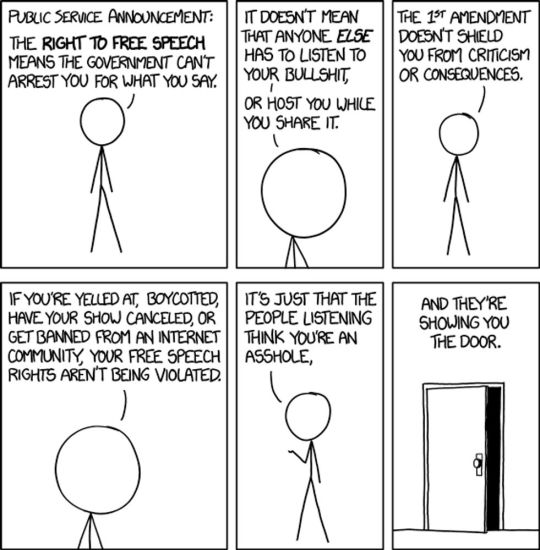
PSA
the more you know
🌈⭐
This way I can always find it when some idiot is like FREE SPEECH. Fuck cancel culture, yada yada yada. Yes, please, say how you really feel so that it's abundantly clear where you stand. Then watch the consequences.
5 notes
·
View notes
Text

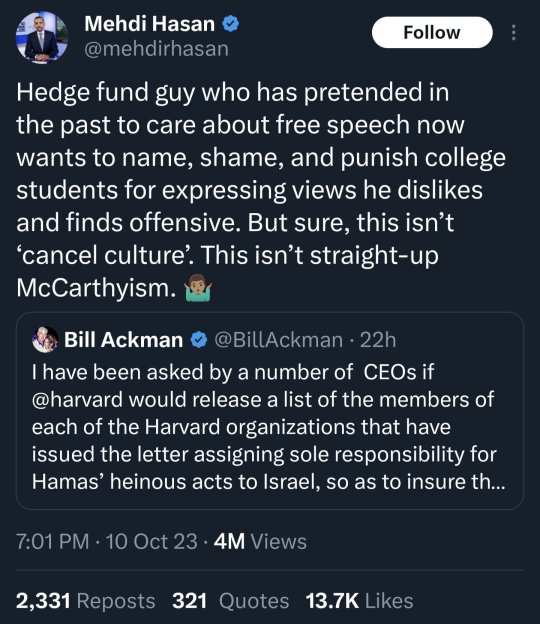
Freedom of speech and cancel culture aside, you deserve everything you are fine with happening to others.
7 notes
·
View notes
Text

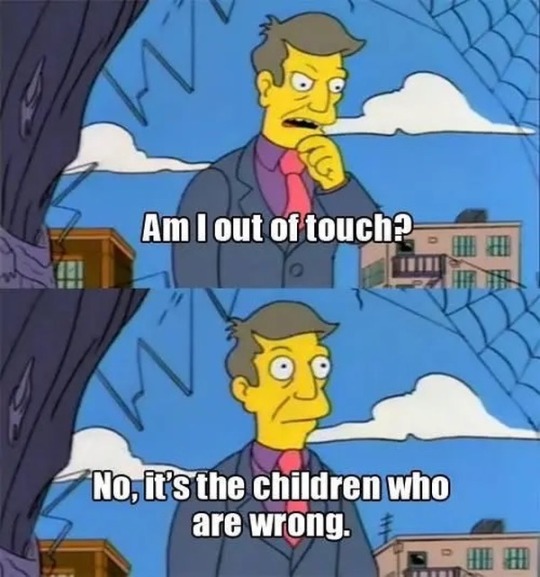
“The same thing happened to me.” said Mrs Bunty Twelvetrees, 84, today. “The only possible conclusion I was able to draw was that my children and grandchildren had become part of the Radical Left Woke Blob as part of a socialist plot. There’s no other answer that makes sense.”
#Daily Telegraph#Children#Grandchildren#You can’t say anything these days#Free speech#Once again#Not the same thing as consequence free speech#Cancel culture#I’m a Christian you know#Bunty Twelvetrees#The blob#The left#Socialist plot#It’s the only answer#It can’t be that I maybe have something to learn#No#It must be everyone else who’s wrong#George Orwell#The true victims here
16 notes
·
View notes
Text
To point out that right-wing culture warriors conflate academic freedom and free speech is, in a sense, to give them too much credit. In practice they subscribe to ‘free speech’ and ‘academic freedom’ only when, and to whichever ideological ends, it suits them. The new Higher Education Act was given royal assent just nine days after the passage of the Public Order Act, which eviscerates the right to peaceful protest in the UK – just in time to empower the Metropolitan Police to arrest six members of the anti-monarchy group Republic on the morning of the coronation, with little outcry from the free speech brigade. Rishi Sunak has defended the police and their new powers, saying that people have the right ‘to go about their day-to-day lives without facing serious disruption’. ‘Serious disruption’ – a phrase that appears 94 times in the Public Order Act – now legally includes many of the mildest tactics used by activist groups from the women of Greenham Common to Extinction Rebellion, including locking on, blocking roads and blockading oil terminals. It also includes, according to the Metropolitan Police, carrying rape alarms, for which three women’s safety volunteers were arrested ahead of the coronation.
Right-wing newspapers unironically celebrated Sunak’s appointment of a free speech tsar as another volley in his war on ‘woke nonsense’ – a campaign, as Sunak described it last year, against objectionable viewpoints that have ‘permeated public life’: that biology doesn’t determine gender, that language is malleable, that Britain must own up to its colonial past. You can seek to eradicate such viewpoints from universities. You can also believe that universities should become no-holds-barred venues for free and open debate. But it takes a certain mental flexibility to think that the one can be a way of achieving the other.
Does the right contradict itself? Very well then it contradicts itself. The new Higher Education Act appears on its face to be in conflict with the ‘Prevent duty’ created by the Counter-Terrorism and Security Act 2015, sponsored by Theresa May when she was home secretary. The government guidance on Prevent says that universities should prohibit visiting speakers who are likely to express ‘extremist views that risk drawing people into terrorism or are shared by terrorist groups’, even where the expression of such views is legal. In 2020 the Department of Education issued guidance on implementing the statutory curriculum which included the requirement that ‘schools should not under any circumstances use resources produced by organisations that take extreme political stances on matters,’ and listed as an example of an ‘extreme’ stance the ‘desire to abolish … capitalism’. Under a new speaker vetting scheme introduced by Jacob Rees-Mogg last year, eight people have been disinvited from speaking at government events, including Dan Kaszeta, a chemical weapons expert, and Kate Devlin, who studies the interaction between humans and technology. Both were told their invitations had been rescinded because they had criticised the Tories on social media.
The Higher Education Act makes universities and student unions that are derelict in their duty to uphold free speech liable to investigations and fines by the free speech tsar, as well as to civil claims brought by anyone who feels they have suffered ‘adverse consequences’ because of a university or student union’s ‘action or inaction’. It’s not clear just what this covers, but here are some possibilities, ordered from the certainly actionable to the potentially so: a student union voting to no-platform fascists; a university failing to quash student protest at a visit from, say, a war criminal; a student group putting out a statement condemning a professor for being transphobic; faculty changing a syllabus in response to student complaints about its racist content; students peacefully protesting outside a lecture; a geography department voting not to hire a climate change denier. It isn’t difficult to imagine how these could be framed as violations of the new law; it is for this reason that its opponents worried, as the bill made its way through Parliament, about the vexatious claims it seems bound to generate. In a letter sent last year to the secretary of state for education, Gillian Keegan, the president of the Union of Jewish Students, warned that the bill could ‘foreseeably allow a range of extremists, including Holocaust deniers, legal recourse to obtain compensation if they are denied a platform’. ‘Adverse consequences’ is an extremely low bar: anyone who has been picketed or called names on Twitter might feel they have grounds to make a legal claim. Traditionally, it has been thought that a commitment to free expression required universities not to intervene when students protest or when faculty members publicly criticise other academics or politicians. But the new law threatens to redefine such non-intervention as itself a failure to promote free speech.
28 notes
·
View notes
Text
Thank you, but I didn’t actually get cancelled in any meaningful way. Valiant attempts were made to drown me (figuratively), but since I don’t have a job I can’t be fired, I’m a tough old bat, I’m too elderly to give much of a poop about my future “career,” it’s not the first hanging party and book-burning featuring myself, and it seems that my Dear Readers were having none of it. Thank you, Dear Readers. It is for you, after all, that I write, not for some craven scholar trying to save her own behind by beating herself up in public for having built her reputation on studies of my oevre. (You know who you are. I accept apologies.)
Why the posse tried to take me down: I signed (and refused to retract, Bad Me!) an open letter to the University of British Columbia (“UBC Accountable”) calling for due and fair process for writer Stephen Galloway, who had been accused — dubiously, it now strongly appears —of rape –a violent criminal act, lest we forget. Nine years later, this claim has still to be thoroughly investigated in a court of law, due to the prolonged and frantic efforts by those being sued for defamation to keep such a trial from happening. But enough preliminary court cases have gone on so that a number of folks have now reversed their snap judgments, and some have gone full Mea Culpa.
You can read all about it in Brad Cran’s Substack called Truth and Consequences; start at the bottom and scroll up. It just gets worse and worse. What was amazing to me was the casualness with which the posse — mostly academics — tossed the Declaration of Human Rights and the Canadian Rights and Freedoms out the window, with cries of “Burn it all down” and the like. But every sword has three sides: your side, the other side, and the Oh Shit! side you didn’t anticipate. Some are now beginning to smoulder themselves, as folks set fire to their feet. Darn, where are those Rights and Freedoms now that a person might need them?
The novelist Margaret Atwood responds in an acerbic style to the attacks she received for having called for due process when the writer Stephen Galloway was accused of rape.
The fact that calling for due process was treated like a crime, while presuming an accusation was true without due process was treated as normal behaviour, shows the level of dystopian tyranny that has overtaken Canadian institutions.
It shows how academics are at the forefront of trashing fundamental pillars of civilisation for the sake of their own ideologies and malignant self-righteousness, which includes smearing and threatening anyone who dares to disagree.
When we acknowledge that many malign tyrannies have been spearheaded by academics (Nazi racism was promulgated by German academics in the 1920's; China's Revolution of 1949 thrived in the universities), then we cannot be surprised by examples such as this.
Such conduct wouldn't be nearly as effective if so many refused to be intimidated and toe the line. When the majority are cowards more concerned about their reputations than about justice, brave voices such as that of Atwood and others who have dared to displease the disciples of currently fashionable movements are seen as radicals: easy to intimidate, abuse, and threaten.
It's time for people to stand up to such intellectual thuggery by defending freedom of speech and the right to the presumption of innocence. When the bullies see that people have a backbone and can't be threatened into silence, they lose their repugnant air of impunity and imagined righteousness.
#margaret atwood#stephen galloway#presumption of innocence#justice#cancel culture#cowardice#freedom of speech#free speech#declaration of human rights#canada#tyranny#academic#academia#politics
2 notes
·
View notes
Text
“A keen sense of what is demonstrably right and what is unambiguously wrong is an immutable requirement for effective leadership, so it is no surprise that the moral midgets in charge today are continuously slipping and sliding from one catastrophe to another—and dragging us along for the ride.”
#cancel culture#censorship#college#culture#democracy#diversity#education#elites#extremism#free speech#higher education#identity politics#leadership#morality#political correctness#protest#religión#social welfare#tolerance#save america
49 notes
·
View notes
Text

A good society contains many different artists doing many different things. A bad society coerces artists because it knows that they can reveal all kind of truths.
Iris Murdoch in conversation with Brian McGee, 1977.
#murdoch#iris murdoch#quote#literature#novelist#writer#artist#role of the artist#freedom#free speech#group think#censorship#cancel culture#society#arts#culture
29 notes
·
View notes
